King of Kings
The Triumph and Tragedy of Emperor Haile Selassie I of Ethiopia
This is a thorough and in-depth view of the last emperor of Ethiopia, told from the unique vantage point of his great-nephew.
The full set of titles of the man known as the last emperor of Ethiopia, whose reign ended in 1974 after nearly sixty years, was “His Imperial Majesty Haile Selassie I, Conquering Lion of the Tribe of Judah, King of Kings, and Elect of God.” But beneath those titles lay a person whom the author, Asfa-Wossen Asserate, knew as his great-uncle. From that unique vantage point, Asserate adds a deeply personal perspective in King of Kings: Triumph and Tragedy of Emperor Haile Selassie of Ethiopia, a thorough and in-depth view of this larger-than-life figure.
It’s a very objective look at the time line of Selassie, named Tafari at birth, but a prince, with the given title Ras,who eventually outmaneuvered all opponents to become Emperor. Selassie is portrayed as wily and shrewd in politics, both within and without the country’s borders. He had to be—Ethiopia was the only African nation that had successfully avoided European colonization, although several countries still expressed lingering interest. Taking his country to the world stage, Selassie gained Ethiopia entrance to the League of Nations, and he led the way when other African countries pressed for independence in the 1950s and 1960s.
Asserate, an author and corporate consultant who lives in Germany but was born and raised in Ethiopia, intertwines history, geography, politics, religion, and human interest to form a fascinating narration that covers much of the landscape of the twentieth century; Selassie dealt with presidents from Franklin Roosevelt to Richard Nixon.
Many of the words are cultural in origin, but the author accommodates readers by vigorously explaining such terms. For example, homini novi were “ambitious, well-educated young men from the middle classes, often with experience of living abroad.”
Asserate’s research includes numerous conversations with members of the imperial family and former political officials who knew and/or worked with Selassie.
Upon Ras Tafari’s accession to the throne on November 2, 1930, rain came to drought-stricken Jamaica, and the descendants of deported African slaves there began believing he was the prophesied “Black King,” evidence of a new future. Taking their name from his, they began calling themselves Rastafarians and their new movement, Rastafarianism.
Reviewed by
Robin Farrell Edmunds
Disclosure: This article is not an endorsement, but a review. The publisher of this book provided free copies of the book to have their book reviewed by a professional reviewer. No fee was paid by the publisher for this review. Foreword Reviews only recommends books that we love. Foreword Magazine, Inc. is disclosing this in accordance with the Federal Trade Commission’s 16 CFR, Part 255.

